|
|
|
Sort Order |
|
|
|
Items / Page
|
|
|
|
|
|
|
| Srl | Item |
| 1 |
ID:
166674
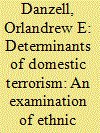

|
|
|
|
|
| Summary/Abstract |
Many scholars have sought to explain why countries with ethnically heterogeneous populations experience higher levels of political violence, but these studies have produced mixed findings. Unlike most studies that use ethno-linguistic fractionalization indices to examine this relationship, we argue that ethnic polarization is a more appropriate measure to assess the role of ethnicity as a causal factor of domestic terrorism. This paper hypothesizes that high ethnic polarization influences the incidence of domestic terrorism, particularly when intervening economic factors are present. To test three hypotheses, we use negative binomial regression to model data from the Global Terrorism Dataset, World Bank, and the Reynal-Querol (RQ) ethnic polarization index of 116 countries between 1970 and 2012. Our findings show that terrorism is more likely to emerge in societies with high ethnic polarization and economic malaise.
|
|
|
|
|
|
|
|
|
|
|
|
|
|
|
|
| 2 |
ID:
122771


|
|
|
|
|
| Publication |
2013.
|
| Summary/Abstract |
Following the 11 September 2001 attacks, the US government increased its counterterrorism (CT) funding and created several Federal Agencies such as the Department of Homeland Security; Transportation Security Administration; and National Counterterrorism Center. Similarly, the 7 July 2005, London bombings also compelled the British government to increase its CT funding. These examples illustrate a phenomenon that when states experience terrorism, they dramatically increase public safety spending in order to reduce or eliminate the incidents of and casualties resulting from acts of terror. Using statistical data collected from 34 countries covering nine years, this article examines recent CT spending increases. Critically, the authors explore whether recent public safety expenditures can measurably reduce the number of domestic and international terrorist attacks. The implications of their findings should be salient for policy-makers' assessments of their countries' current CT strategies and policies concerning their respective Intelligence and Security Communities.
|
|
|
|
|
|
|
|
|
|
|
|
|
|
|
|
| 3 |
ID:
175744
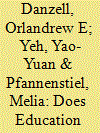

|
|
|
|
|
| Summary/Abstract |
Policymakers often tout expanded access to education as an antidote for terrorism in Africa. Targeted economic development is also considered a necessary complement to education gains because young, well-educated individuals who lack viable opportunities are vulnerable targets of radicalization. Despite common assertions that poor socioeconomic circumstances drive radicalization, empirical research has hitherto neglected critical inquiry of these policies. Varied findings across cross-national studies of education expansion and the effects of burgeoning youth cohorts warrant a focused examination of regions plagued by the proliferation of extremist groups. This study explores the role of education in mitigating a turn to terror among youth in Africa by examining 50 countries from 1970 to 2011. Expansions in primary, secondary, and tertiary education appear to have different influences on domestic terrorism. In the sub-Saharan region, one model shows primary and secondary education reduced terrorism while others indicate non-monotonic effects in societies experiencing a youth bulge. These nuanced findings suggest education should not be relied upon to counter extremism without additional initiatives to facilitate socioeconomic opportunities. The implication of this paper’s findings are important for academics and policymakers eager to create stable polities across the African continent.
|
|
|
|
|
|
|
|
|
|
|
|
|
|
|
|
| 4 |
ID:
188796
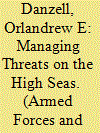

|
|
|
|
|
| Summary/Abstract |
Weak coastal states often lack an adequate, sustained naval presence to monitor and police their territorial waters. Unpatrolled waters, both territorial and otherwise, may provide pirates with substantial financial opportunities that go far beyond any single country. Maritime piracy costs the global economy on average USD 24 billion per year. This research explores the impact of naval bases on acts of piracy to determine if naval presence can decrease the likelihood of piracy. To examine this important economic and national security issue, our research employs a zero-inflated negative binomial regression model. We also rely upon a newly constructed time-series dataset for the years 1992–2018. Our study shows that the presence of naval bases is essential in helping maritime forces combat piracy. Policymakers searching for options to combat piracy should find the results of this study especially useful in creating prescriptive approaches that aid in solving offshore problems.
|
|
|
|
|
|
|
|
|
|
|
|
|
|
|
|
| 5 |
ID:
101858
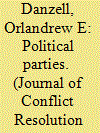

|
|
|
|
|
| Publication |
2011.
|
| Summary/Abstract |
The purpose of this article is to explain the creation of terrorist organizations by political parties. Extant literature argues that institutional structural constraints, such as electoral systems, are more likely to lead political parties to create terrorist organizations. However, this article hypothesizes that party ideology is also an important factor that explains the creation of terrorist organizations by political parties. Using a Poisson random effect model for panel data on twenty-eight countries between 1965 and 2003, this article shows that party ideology is positively correlated with the formation of terrorist organizations even after controlling for institutional structural constraints. The implication of these findings is important for policy makers eager to create stable polities.
|
|
|
|
|
|
|
|
|
|
|
|
|
|
|
|
| 6 |
ID:
188076
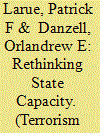

|
|
|
|
|
| Summary/Abstract |
The civil conflict literature often relies on state capacity having significant impacts on the risk of, and duration of, civil war and other civil conflicts. Many characteristics of civil conflict are often similar to terrorism, especially domestic terrorism, and are also considered when discussing the predictors of terror. However, what is not considered in either area of the literature is alternative characteristics of state capacity, namely, the degree of fragmentation in the policymaking branches, and its ability to enforce and carry out the laws that are implemented. This paper examines these effects, expanding the interpretation of state capacity to include these aforementioned concepts, and testing them simultaneously with the extant interpretation of capacity. Results show that when including these additional characteristics of capacity, previously accepted predictors are no longer relevant in predicting terrorism.
|
|
|
|
|
|
|
|
|
|
|
|
|
|
|
|
|
|
|
|
|